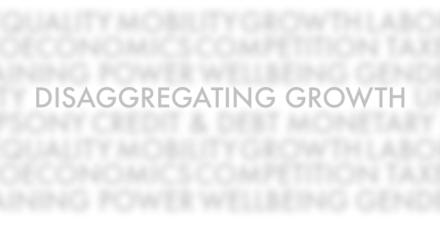Brad DeLong: Worthy reads on equitable growth, October 6-13, 2020
Worthy reads from Equitable Growth:
1. I was going to note this a while ago, but it vanished into THE PILE, and I have only now managed to dig it out. Read Heather Boushey and Somin Park, “The coronavirus recession and economic inequality: A roadmap to recovery and long-term structural change,” in which they write: “The coronavirus pandemic presents a new and unprecedented challenge to the United States. First and foremost, it is a public health crisis that makes it impossible for our society and our economy to function as usual due to the necessary social distancing required for the health of us all. Because the federal government neither acted early enough to contain the deadly coronavirus nor swiftly enough to forestall mass layoffs, our nation is now facing a health crisis and economic recession simultaneously. What’s more, the underlying problems of U.S. economic inequality today will only prolong and deepen this coronavirus recession … Only a decade has passed since the end of the previous global financial crisis … Decades of failed economic policies, based on ideology instead of evidence, and a blind adherence to the idea that markets can solve every problem, have made our economy and our society more vulnerable…. Broad policy principles to help guide policymakers … [are to] recognize that markets cannot perform the work of government. Address fragilities in our markets themselves. Keep income flowing to all the unemployed workers and small businesses now and in future crises. Ensure those who are still employed can stay employed. Produce headline economic statistics that represent the well-being of all Americans …To have any chance of emerging on a stronger footing as a nation with less economic inequality and more sustainable economic growth, policymakers need to enact a robust set of protections that will ensure high-end inequality is contained, build counterweights to concentrated power, and provide economic security for all now and going forward.”
2. The de-unionization of the United States has had an enormous number of bad consequences that we are still digging through. Here is one more, courtesy of Alexander Hertel-Fernandez and Alix Gould-Werth. Read “Labor organizations and Unemployment Insurance: A virtuous circle supporting U.S. workers’ voices and reducing disparities,” in which they write: “We identify descriptive evidence that: Labor organizations facilitate the use of unemployment benefits and, in the process, help close troubling racial and educational gaps in access to Unemployment Insurance. Greater access to Unemployment Insurance amid the ongoing coronavirus recession leads workers to feel more comfortable engaging in workplace collective action to demand better safety and health standards. Together, labor organizations and Unemployment Insurance form a “virtuous circle,” in which greater access supports workplace collective action, including forming labor unions, which, in turn, support greater access to unemployment benefits. These findings suggest[:]… U.S. labor law and Unemployment Insurance policies should complement one another. Federal and state governments should support unions and worker organizations in connecting workers with the Unemployment Insurance system … A European model, in which unions or worker organizations directly administer unemployment benefits on behalf of the government … should [be] consider[ed] … given the strong level of public support for such a model.”
Worthy reads not from Equitable Growth:
1. I’m starting a DeLongToday weekly half-hour video series. On Wednesday October 7, I did the U.S. economic outlook. It is not good: Watch me at “DeLongToday.” The next broadcast begins at 10:00 a.m. EDT on Wednesday, October 14, and stay for a 30 minute “BRADCHAT” Q&A.
2. Kleptocracy comes to the United States, big time, naked, and proud. Read Ben Thompson, “The TikTok Deal, The Wrong Danger, TikTok Takeaways,” in which he writes: “I don’t put a whole lot of stock in Oracle’s overview: First, there was no indication that Oracle has any sort of legal responsibility for the TikTok algorithm. Apparently they will check it because they promise to? Second, I don’t have much faith that Oracle has the capabilities to truly check the algorithm, both because it is machine learning derived (and thus constantly evolving, even as it is individual tuned to subscribers), and also because all of the documentation is in Chinese. Third, the fact that ByteDance can deliver a code dump to Oracle has precious little to do with whatever it is that TikTok is actually doing in real time, both in terms of censorship and propaganda. Indeed, this entire bit seems so impractical to me that it is hard to interpret it as anything other than a sop to people like me who actually think this is a real issue. In short, this deal is the worst possible outcome: First, there is at best a marginal gain in U.S. data security, which probably wasn’t a concern in the first place. Second, there are only fig leaf improvements to the question of the recommendation algorithm, which will have zero impact on very real concerns around the Chinese Communist Party’s ability to censor and push propaganda to U.S. consumers. Third, the very concept of the rule of law is in shambles, as the only real change from the original Microsoft deal is to ensure that ByteDance keeps the company while Trump donors get a cloud deal. This last point can’t be made enough: this deal is significantly worse than the original Microsoft deal that Trump squashed, but unfortunately for Satya Nadella, he wasn’t a big Trump donor. I hate to be cynical, but it’s honestly hard to see what else mattered.”



